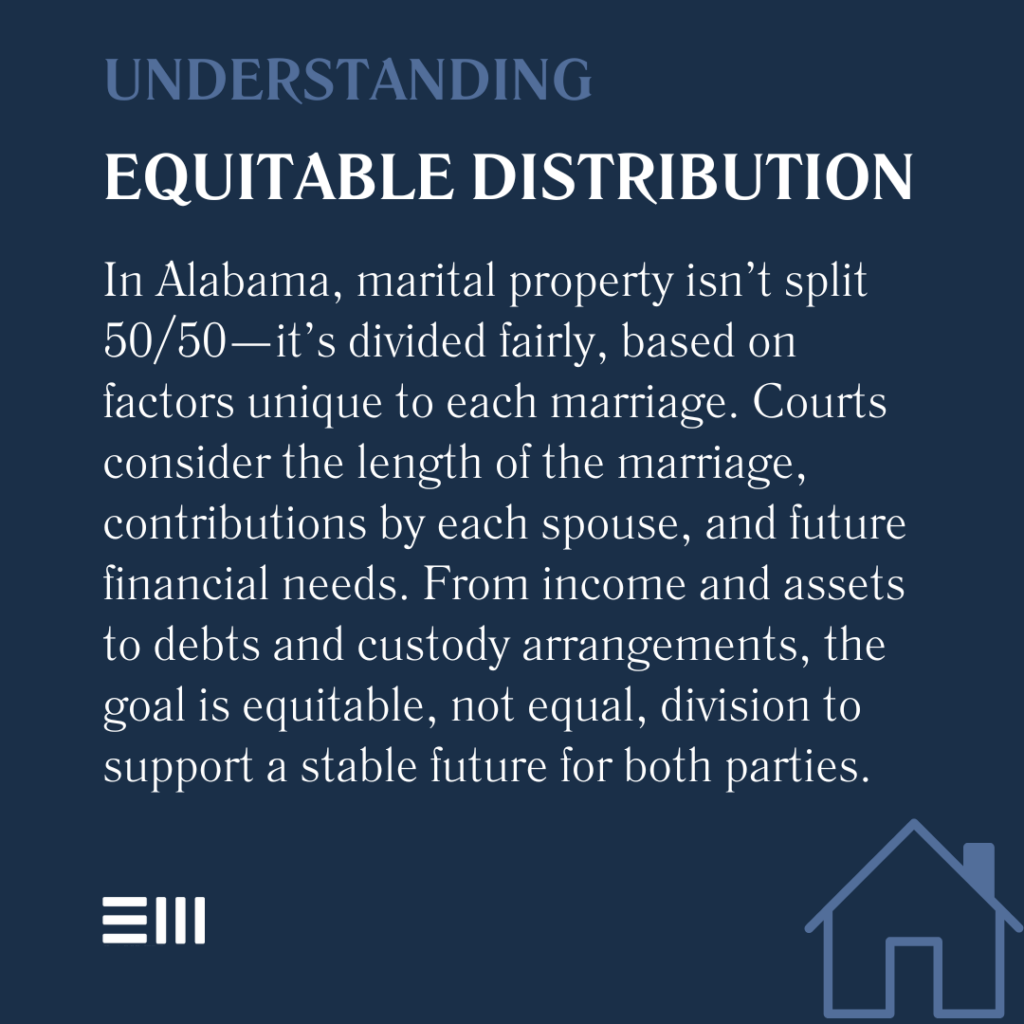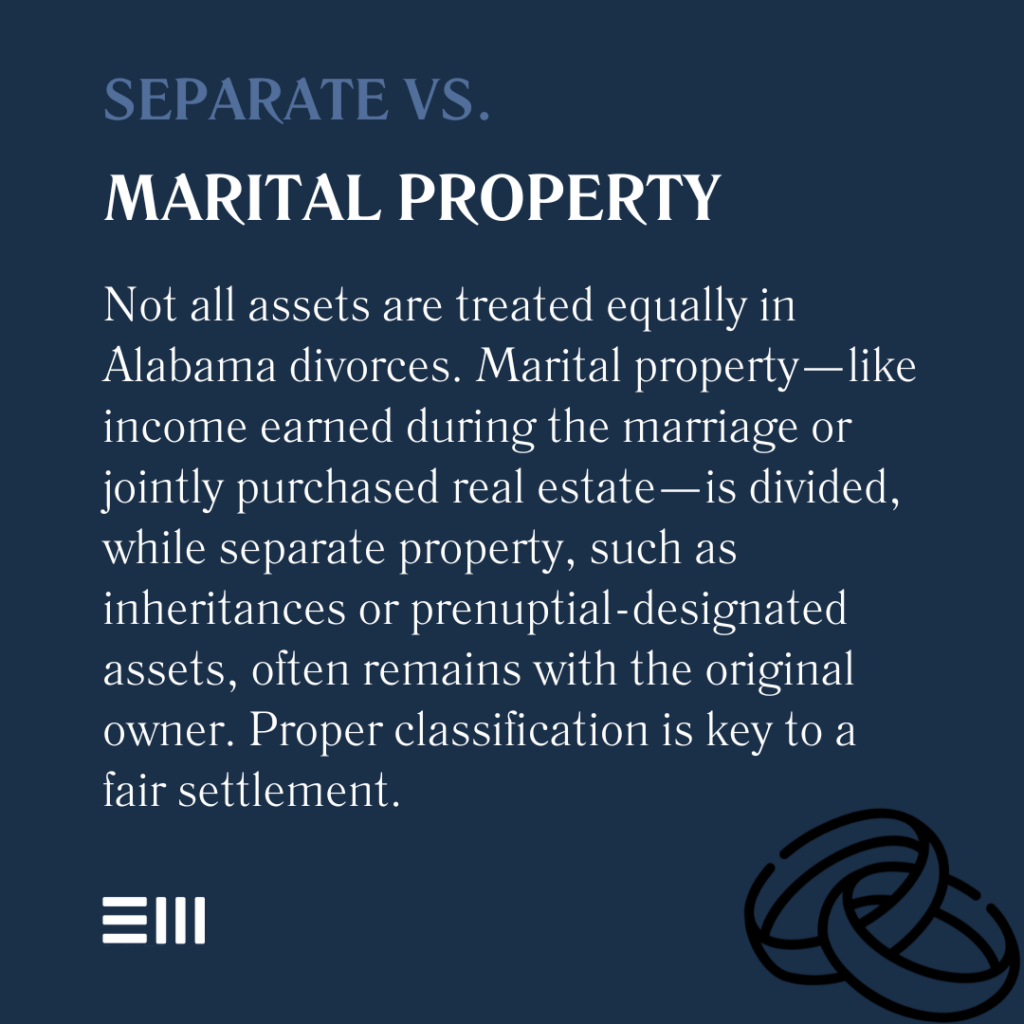
From family heirlooms to retirement accounts, the belongings accumulated during a marriage often carry both financial and emotional weight.
While money can’t buy happiness, the way property gets divided in an Alabama divorce can impact your financial stability for years to come.
Whether you’re facing difficult decisions about the family home or complex questions about business valuations, understanding Alabama’s property division laws can help you protect what matters most.
Understanding Equitable Distribution in Alabama
Alabama follows equitable distribution principles when dividing marital property during divorce. This approach seeks to divide property fairly—though not necessarily equally—between spouses based on various factors unique to each marriage.
Before diving into specific considerations, it’s important to note that Alabama courts look at the complete financial picture of both parties to determine a fair distribution.
Courts consider factors such as:
- The length of the marriage and each spouse’s age and health condition, which can significantly impact their future earning potential and financial needs;
- Each spouse’s current and future income-earning capacity, including education, training, and employment history;
- Contributions to the marriage, including homemaking, child-rearing, and supporting a spouse’s education or career advancement;
- The standard of living established during the marriage and each spouse’s ability to maintain it post-divorce;
- Tax consequences of property division and the costs associated with maintaining specific assets;
- Custody arrangements and which parent will primarily reside in the marital home;
- The conduct of the parties during the marriage, particularly in cases involving financial misconduct; and
- Any existing debts and liabilities that need to be divided between the parties.
Understanding these factors helps create realistic expectations about property division outcomes. Each case receives individual consideration based on its unique circumstances and the totality of evidence presented to the court.

Separate vs. Marital Property in Alabama
Before property can be divided, it must be properly classified. Alabama law distinguishes between separate and marital property, which significantly impacts how assets are distributed during divorce.
Separate property typically includes:
- Assets owned before the marriage that remained separately titled;
- Inheritances received by one spouse during the marriage;
- Gifts specifically given to one spouse;
- Personal injury settlements for non-economic damages;
- Property designated as separate in a valid prenuptial agreement;
- Assets acquired after a legal separation; and
- Property acquired in one spouse’s name and never used for the benefit of the marriage.
Marital property generally encompasses:
- Income earned by either spouse during the marriage;
- Real estate purchased during the marriage, regardless of whose name is on the title;
- Retirement benefits and pension plans accumulated during the marriage;
- Businesses started or grown during the marriage;
- Vehicles, furniture, and other assets acquired with marital funds;
- Appreciation in value of separate property due to marital efforts;
- Joint bank accounts and investments; and
- Debts incurred for the benefit of the marriage.
The distinction between separate and marital property can become complex when assets have been commingled or when separate property has appreciated due to marital efforts.
A detailed analysis ensures proper classification of all assets.

Complex Asset Division Considerations
The division of complex assets requires careful analysis and often specialized expertise. These situations demand particular attention to ensure fair valuation and distribution.
Business valuation experts may be needed to:
- Determine the true value of privately owned companies;
- Calculate goodwill and future earning potential;
- Assess the impact of market conditions on business value;
- Identify hidden assets or unreported income;
- Evaluate professional practices and their associated values; and
- Analyze business debt and liability exposure.
Financial professionals frequently assist with:
- Evaluating retirement accounts and pension plans;
- Determining tax implications of various division scenarios;
- Assessing investment portfolios and market risks;
- Creating plans for dividing complex assets while minimizing penalties;
- Structuring settlements to maximize tax efficiency; and
- Analyzing mortgage refinancing options.
Professional appraisals might be necessary for:
- Real estate holdings and investment properties;
- Valuable collections or antiques;
- Jewelry and precious metals;
- Vehicles and recreational equipment;
- Art collections and rare items; and
- Livestock and farming equipment.
This thorough evaluation process helps ensure all assets are properly valued before division discussions begin.
The Role of Debt in Property Division
Understanding how Alabama courts handle marital debt is crucial for a complete picture of property division.
During a divorce, the court must determine how to allocate both assets and liabilities fairly.
Common types of marital debt include:
- Mortgage loans and home equity lines of credit;
- Credit card balances used for family expenses;
- Auto loans for vehicles used during the marriage;
- Business loans for marital enterprises;
- Student loans incurred during the marriage; and
- Medical debts accumulated during the marriage.
The court considers several factors when dividing debt:
- Which party incurred the debt;
- The purpose of the debt;
- Each party’s ability to pay;
- The relationship between the debt and marital assets; and
- Whether the debt benefited the marriage.
After careful consideration of these elements, the court works to create an equitable distribution plan that addresses both assets and liabilities.
Frequently Asked Questions About Property Division in Alabama Divorces
Understanding property division can be complex.
Here are answers to common questions that arise during the divorce process.
What Happens to the Marital Home in an Alabama Divorce?
The marital home often represents the largest asset in divorce proceedings. Courts consider factors like child custody arrangements, mortgage obligations, and each spouse’s financial ability to maintain the property. Options typically include selling the home and dividing proceeds, one spouse buying out the other’s interest, or continued co-ownership until a specified future date.
How Are Retirement Accounts Divided?
Retirement accounts require special attention due to their tax implications and complex division rules. A Qualified Domestic Relations Order (QDRO) is often necessary to divide these assets without incurring penalties. The portion of retirement benefits earned during the marriage is generally considered marital property subject to division.
Can One Spouse Hide Assets During Divorce?
Concealing assets during divorce is illegal and can result in severe penalties. Courts require full financial disclosure from both parties. Discovery tools like depositions, interrogatories, and requests for documentation help ensure transparency in the property division process.
What Role Do Prenuptial Agreements Play?
Valid prenuptial agreements typically override Alabama’s equitable distribution laws. However, these agreements must meet specific legal requirements to be enforceable. Courts may set aside prenuptial agreements that are unconscionable or were signed under duress.
How Are Inherited Assets Treated?
Inherited assets generally remain separate property if kept distinct from marital assets. However, if inherited property is commingled with marital assets or used for the benefit of the marriage, it may lose its separate character and become subject to division.
What About Digital Assets and Cryptocurrency?
Digital assets, including cryptocurrency, online businesses, and digital collections, are subject to division like any other marital property. Special consideration must be given to valuation and transfer methods for these modern assets.
Post-Divorce Property Considerations
Even after the property division is finalized, several important matters require attention:
- Updating titles and deeds to reflect new ownership;
- Transferring retirement accounts according to QDROs;
- Refinancing joint debts into individual names;
- Updating estate planning documents and beneficiary designations;
- Maintaining proper insurance coverage on divided assets; and
- Following through with any required property transfers.
Attention to these details helps ensure a smooth transition and prevents future complications.
Take Control of Your Property Division Process
Don’t navigate property division alone. Our experienced divorce attorneys understand Alabama’s complex property division laws and can protect your interests throughout the process.
Contact us today for a confidential consultation and learn how we can help secure your financial future.
Can't find what you're looking for? Search our site below.










